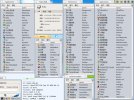FreeDOS reminded me of Public Domain OS. What's interesting about PDOS is: it comes under public domain license, it has a 32bit version which has compatibility with programs which are fullscreen intended for Windows in 32bit. It also has a download for ARM SBC's (ie Raspberry Pi), this is likely 32bit as ARM first came out in this. This is useful, as legacy operating systems should be run on SBC's instead of using obsolete, overly sized hardware. There's also x86 and x86_64 versions.
https://www.pdos.org/
The nature of PDOS, is belief in using public domain where available and promoting public domain, instead of closing off software to the public. MIT serves a similar purpose, which BSD license comes close to. I prefer file based licenses, as it preserves freedom of use, with the exception of by viral licenses which choose to not use other opensource. For larger projects, it protects freedom of code use better. I'm a fan of trying this OS on a 32bit SBC.
That reminds of the 16bit DOS versions released to opensource by Microsoft:
https://github.com/microsoft/MS-DOS. That is limited to 16bit, however.
Found a few Public domain OS:
Genode uses AGPL3. It's not an OS in itself, but the page has a list of Genode created operating systems. Perhaps OS with other licenses can be made from it.
I wish, I specified with nonviral licenses, bc those OS's need attention, and there's too much GPL. The good is that FreeDOS is on here, and it reminds of PDOS and a version of open sourced MsDOS. I might leave this be, and do a separate thread of a refined list. I also previously put in the title for x86_64, but I'm removing this part: the original post only contains x86_64 which missed a few posted afterwards. ARM and RISC (32bit) deserve attention for lightweight operating systems with nonviral licenses. Then ARM64 and RISC64 as well for more featured OS's. There are other nifty project OS's that deserve attention too.
Include any architecture and any opensource license, GPL included. I can make threads on refined lists later. All legacy operating systems should run on SBC's, leaving full featured OS's to run on modern hardware.
For defunct OS's
https://archiveos.org. Minix isn't defunct, but it may need a revival, and has potential for other OS aside from Redox take inspiration from it.
Rust based
Adding other Rust based operating systems can make this thread long and not standard, but go ahead.
Refs & further reading



